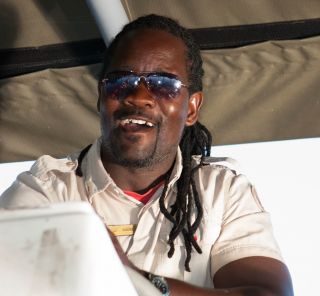Humor
Forming Your Pack
When your life may depend upon it, how do you create a team--fast?
Posted June 19, 2014
“My Name is Name.”

Join my pack!
Our guide for a Botswana safari trip has a long name (Nametsegang), which is a tad unpronounceable for most clients, so he shortened it to a catchy one that English speakers can remember. Right from the get go, you smile and are right with him.
And that’s part of what he’s hoping for.
From the moment he introduces himself, Name deliberately builds rapport because he has a goal: he wants the people in his eight seat open Land Cruiser to become his pack and follow his rules. To get there, he needs to transform them into a team and do it fast. For 3-6 days, guests will spend 8-10 hours a day with him during meals or game drives into the bush at Duma Tau, where wild dogs and lions, elephants and impala, vultures and crocodiles eat, sleep, and hunt. He’s responsible for giving them a life changing experience, but most importantly, he is responsible for their safety. Getting people to work with him and bond with each other helps make this happen. So he uses psychology in addition to tracking.
He might have a family group of six or seven. Or, it could be three pairs of people, none of whom know each other. Name has to interact with the full group, with the smaller groups, and with people as individuals (a wife separate from her husband).

Name understands elephants ... and clients.
So how does he create his “team” so quickly?
Building rapport. Name starts with his engaging name, Name, and then asks about each person’s home and reasons for the visit.
Managing expectations. During the 40 minute drive from the airstrip to the camp, he asks what the guests want–to see lions or birds or to spend time with family members away from home. While he can’t guarantee seeing certain animals, he can provide “different, interesting experiences”— Okavango Delta geology, migration patterns, and local culture; he points out the mongoose pack living in a termite mound. And he tracks a leopard on the hunt for food.
Being present and showing patience. Name helps people enjoy what they experience in the present, rather than expect something that may (or may not) appear. Botswanans are enormously patient, learned in the bush from watching lions track a Cape Buffalo herd for three days. Lions, and bush guides like Name, don’t waste energy on getting angry or hasty. His employer, Wilderness Safaris, looks for and then trains guides to retain that sense of resilience and calm, even when his pack members may have disagreements.
Engaging and connecting. Name finds separate interests and focuses on those for individuals but then draws them into a whole. He builds group bonds by asking “What animal interaction was most interesting today? Why do you think the lions didn’t chase the warthog?” He adjusts to the group, draws out and plays with their sense of humor, which could be raucous or understated.
And within a few hours, Name’s Pack has formed and would do just about anything he asks! Including having a life changing experience.


